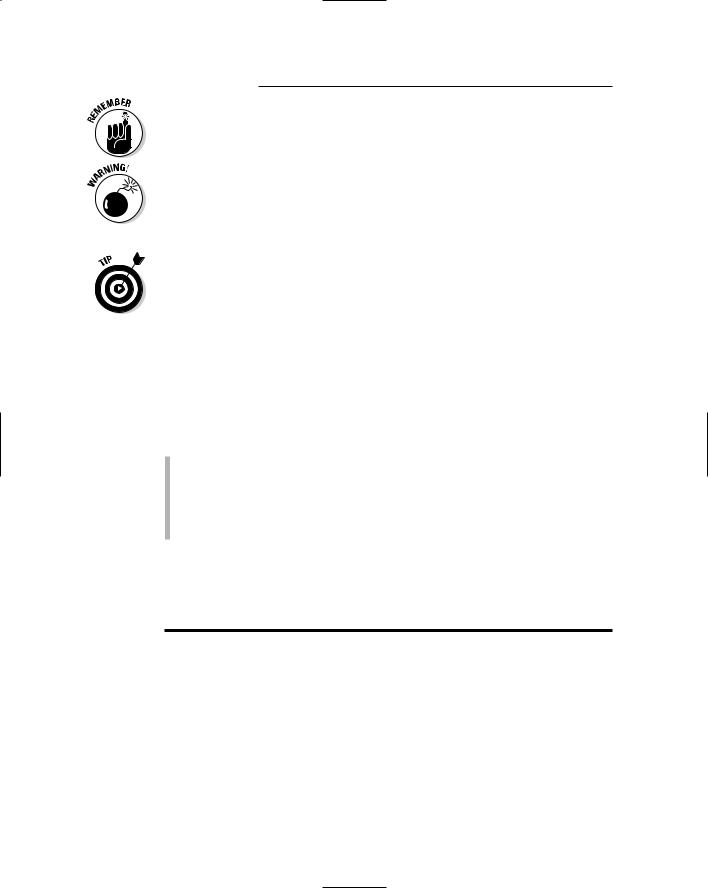
Russian For Dummies
.pdf
84 |
Part II: Russian in Action |
You can use the phrase My amyerikantsy for any group of American men, women, or mixed genders.
Russian is very specific about gender. If you’re a male, make sure you use the word indicating the nationality of a man, and if you’re a female, use the word indicating the nationality of a woman. Imagine a man introducing himself as Ya amyerkinanka. Although people will understand what he’s saying, they’ll be quite amused, and if you’re that man, you may be just a tad embarrassed.
Most Russians are highly educated people. They know that the United States, Australia, and Great Britain are ethnically diverse countries. Therefore, they also ask the question A kto vy po-natsional’nosti? (ah ktoh vih puh-nuh-tsee- ah-nahl’-nuhst-ee; And what is your nationality?) to find out your specific ethnic heritage (rather than your nationality). This situation is especially true if you don’t look like a “typical American,” which to a Russian means a blueeyed, blond, tall, and athletic-looking Anglo-Saxon.
Another possibility is that your new Russian friend will attempt to guess your nationality instead of asking you outright. Most Russians are very good at recognizing foreigners in a crowd of people and sometimes are even able to guess your nationality just by looking at you. If this is the case, you may hear questions like these right off the bat:
Vy amyerikanyets? (vih uh-mee-ree-kah-neets; Are you American? Literally: Are you an American man?)
Vy amyerikanka? (vih uh-mee-ree-kahn-kuh; Are you American? Literally: Are you an American woman?)
Vy amyerikantsy? (vih uh-mee-ree-kahn-tsih; Are you Americans?)
In Table 4-1 you find a list of some nationalities and specific ethnicities. Find the one that best describes your background, and note that Russian doesn’t capitalize names of nationalities and ethnic backgrounds.
Table 4-1 |
Words Denoting Nationality and Ethnicity |
||
Nationality |
Nationality |
Nationality |
Translation |
of a Man |
of a Woman |
of People |
|
afrikanyets (uhf- |
afrikakanka (uhf- |
afrikantsy (uhf-ree- |
African |
ree-kah-neets) |
ree-kahn-kuh) |
kahn-tsih) |
|
|
|
|
|
amyerikanyets (uh- |
amyerikanka (uh- |
amyerikantsy (uh- |
American |
mee-ree-kah-neets) |
mee-ree-kahn-kuh) |
mee-ree-kahn-tsih) |
|
|
|
|
|
indyeyets (een- |
indiyanka (een- |
indyejtsy (een- |
American |
dye-eets) |
dee-ahn-kuh) |
dyey-tsih) |
Indian |
|
|
|
|
arab (uh-rahp) |
arabka (uh-rahp-kuh) |
araby (uh-rah-bih) |
Arab(ic) |
|
|
|
|

|
|
Chapter 4: Getting to Know You: Making Small Talk |
85 |
|||
|
|
|||||
|
|
|
|
|
|
|
|
Nationality |
Nationality |
Nationality |
Translation |
|
|
|
of a Man |
of a Woman |
of People |
|
|
|
|
argyentinyets (uhr- |
argyentinka (uhr- |
argyentintsy (uhr- |
Argentinean |
|
|
|
geen-tee-neets) |
geen-teen-kuh) |
geen-teen-tsih) |
|
|
|
|
kitayets (kee- |
kitayanka (kee- |
kitajtsy (kee-tahy- |
Chinese |
|
|
|
tah-eets) |
tuh-yan-kuh) |
tsih) |
|
|
|
|
|
|
|
|
|
|
|
yegiptyanin (ee- |
yegiptyanka (ee- |
yegiptyanye (ee- |
Egyptian |
|
|
|
geep-tya-neen) |
geep-tyan-kuh) |
geep-tya-nee) |
|
|
|
|
|
|
|
|
|
|
|
anglichanin (uhn- |
anglichanka (uhn- |
anglichanye (uhn- |
English |
|
|
|
glee-chah-neen) |
glee-chahn-kuh) |
glee-chah-nee) |
|
|
|
|
frantsuz (fruhn- |
frantsuzhyenka |
frantsuzy (fruhn- |
French |
|
|
|
tsooz) |
(fruhn-tsoo-zhihn-kuh) |
tsoo-zih) |
|
|
|
|
|
|
|
|
|
|
|
nyemyets (nye- |
nyemka (nyem-kuh) |
nyemtsy (nyem-tsih) |
German |
|
|
|
meets) |
|
|
|
|
|
|
|
|
|
|
|
|
|
indus (een-doos) |
indiyanka (een- |
indusy (een-doo-sih) |
Indian |
|
|
|
|
dee-ahn-kuh) |
|
|
|
|
|
iranyets (ee-rah- |
iranka (ee-rahn-kuh) |
irantsy (ee-rahn-tsih) |
Iranian |
|
|
|
neets) |
|
|
|
|
|
|
|
|
|
|
|
|
|
irlandyets (eer- |
irlandka (eer- |
irlandtsy (eer-lahn- |
Irish |
|
|
|
lahn-deets) |
lahn-kuh) |
tsih) |
|
|
|
|
|
|
|
|
|
|
|
ital’yanyets (ee- |
ital’yanka (ee-tuhl- |
ital’yantsy (ee-tuhl- |
Italian |
|
|
|
tuhl-ya-neets) |
yan-kuh) |
yan-tsih) |
|
|
|
|
yaponyets (ee-poh- |
yaponka (ee- |
yapontsy (ee-pohn- |
Japanese |
|
|
|
neets) |
pohn-kuh) |
tsih) |
|
|
|
|
|
|
|
|
|
|
|
yevryej (eev-ryey) |
yevryejka (eev- |
yevryei (eev-rye-ee) |
Jewish |
|
|
|
|
ryey-kuh) |
|
|
|
|
|
|
|
|
|
|
|
|
myeksikanyets (meekmyeksikanka (mee- |
myeksikantsy (mee- |
Mexican |
|
||
|
see-kah-neets) |
ksee-kahn-kuh) |
ksee-kahn-tsih) |
|
|
|
|
polyak (pah-lyak) |
pol’ka (pohl’-kuh) |
polyaki (pah-lya-kee) |
Polish |
|
|
|
|
|
|
|
|
|
|
russkij (roos-keey) |
russkaya (roos- |
russkiye (roos- |
Russian |
|
|
|
|
kuh-ye) |
kee-ye) |
|
|
|
|
|
|
|
|
|
|
|
shotlandyets |
shotlandka (shaht- |
shotlandtsy (shaht- |
Scottish |
|
|
|
(shaht-lahn-deets) |
lahn-kuh) |
lahn-tsih) |
|
|
|
|
|
|
|
|
|
|
|
ispanyets (ees- |
ispanka (ees- |
ispnatsy (ees- |
Spanish |
|
|
|
pah-neets) |
pahn-kuh) |
pahn-tsih) |
|
|
|
|
turok (too-ruhk) |
turchanka (tuhr- |
turki (toor-kee) |
Turkish |
|
|
|
|
chahn-kuh) |
|
|
|
|
|
|
|
|
|
|
|

86 |
Part II: Russian in Action |
Most words denoting nationality of women have the ending -ka as in amyerikanka (American woman). Many words denoting nationality of men end in -yets as in kitayets (Chinese man). Some words, however, slightly divert from this rule, such as the word frantsuz (frahn-tsoos; Frenchman). Most words denoting the nationality of people (plural) have the ending -tsy. Exceptions to the words you may be using a lot include the following:
russkij (roos-keey; Russian male)
russkaya (roo-skuh-ye; Russian female)
russkiye (roo-skee-ye; Russians)
Other exceptions are words like yevryei (eev-rye-ee; Jewish people) and anglichanye (uhn-glee-chah-nee; English people). Unfortunately, no hard and fast rule exists for this, so you just need to memorize the words as they are.
Note the translation of the word “Indian.” English uses the word “Indian” for both American and Asian Indians. Russian uses indus to indicate an Asian Indian man and indyeyets to indicate a Native American man. This difference eliminates the ambiguity of English. However, this distinction disappears in the word indiyanka, which denotes both an Asian Indian and an American Indian woman, but the distinction reappears when you refer to a group of Indians (either indusy or indyejsty).
Talkin’ the Talk
John and Natasha are on board a flight from Frankfurt to Moscow.
They’ve just met.
Natasha: |
Dzhohn, otkuda vy? |
|
dzhon, aht-koo-duh vih? |
|
John, where are you from? |
John: |
Ya amyerikanyets. A vy russkaya? |
|
ya uh-mee-ree-kah-neets. ah vih roos-kuh-ye? |
|
I’m American. And are you Russian? |
Natasha: |
Da, russkaya. Ya zhivu v Pyermi. A gdye vy zhivyotye |
|
v Amyerikye? |
|
dah, roos-kuh-ye. ya zhih-voo f pyer-mee. ah gdye vih |
|
zhih-vyo-tee v uh-mye-ree-kee? |
|
Yes, I am Russian. I live in Perm. And where do you |
|
live in the U.S.? |
John: |
Ya iz shtata Viskonsin. Ya zhivu i uchus’ v Madisonye. |
|
ya ees-shtah-tuh vees-kohn-seen. ya zhih-voo ee oo- |
|
choos’ v mah-dee-sohn-ee. |

|
|
Chapter 4: Getting to Know You: Making Small Talk |
87 |
|
|
|
|||
|
|
I’m from the state of Wisconsin. I live and study in |
|
|
|
|
Madison. |
|
|
|
Natasha: |
Kak intyeryesno! Vy nye pokhozhi na amyerikantsa. |
|
|
|
|
Kto vy po-natsional’nosti? |
|
|
|
|
kahk een-tee-ryes-nuh! vih nee pah-khoh-zhih nuh |
|
|
|
|
uh-mee-ree-kahn-tsuh. ktoh vih puh-nuh-tsih-ah- |
|
|
|
|
nahl’-nuhs-tee? |
|
|
|
|
How interesting! You don’t look American. What’s |
|
|
|
|
your nationality? |
|
|
|
John: |
Moya mama myeksikanka, a papa ital’yanyets. |
|
|
|
|
mah-ya mah-muh meek-see-kahn-kuh, uh pah-puh |
|
|
|
|
ee-tuhl-ya-neets. |
|
|
|
|
My mother is Mexican, and my father is Italian. |
|
|
|
Natasha: |
Ponyatno. |
|
|
|
|
pah-nyat-nuh. |
|
|
|
|
I see. |
|
|
|
|
|
|
|
Words to Know
Otkuda vy? |
aht-koo-duh vih |
Where are you |
|
|
from? |
Gdye vy zhivyotye? |
gdye vih zhih-vyo-tee |
Where do you live? |
Ya zhivu v . . . |
ya zhih-voo v |
I live in . . . |
Kto vy po |
ktoh vih puh-nuhts- |
What’s your |
natsional’nosti? |
ee-ah-nahl’-nuhst-ee |
nationality? |
Vy nye pokhozhi |
vih nee pah-khoh- |
You don’t look |
na . . . |
zhih nuh |
like a . . . |
Ya uchus’ v |
ya oo-choos’ v |
I study at/in |
iz shtata |
ees-shtah-tuh |
from the state |
Kak intyeryesno! |
kahk een-tee-ryes-nuh |
How interesting! |
Ponyatno |
pah-nyat-nuh |
I see |

88 |
Part II: Russian in Action |
The nationality question: A touchy subject
The question Kto vy po natsional’nosti? (ktoh vih puh-nuhts-ee-ah-nahl’-nuhst-ee; What’s your nationality?) isn’t just a matter of small talk for Russians. The question of one’s ethnic background has been important in Russia from time immemorial. Unfortunately, Russians weren’t always welcoming of foreigners. For centuries, in the big Russian Empire, non-Russians, including other Slavs such as Ukrainians, Byelorussians, and Poles were officially and unofficially considered to be inferior to the Great Russians. Great Russian nationalism, which is still very much alive today, goes back to the official policy of the Russian autocracy toward national minorities.
An example of Russian nationalism was the policy of Russification started by Catherine the Great (a German by birth) in the 18th century. Russification was an attempt to inspire a sense of Russian-ness in all peoples through a
reverence for Russia’s past, traditions, and culture, through the use of the Russian language, and by converting non-Christians to the Orthodox faith. Many people were forbidden to use their non-Russian language in schools and in the administration.
The results of Russification were especially evident in the policy of the authorities toward the Jews. Jews were classified as inorodsty (een- ah-rohd-tsih; non-citizens/aliens), who were non-Christian and considered second-class citizens. Joseph Stalin, who was a Georgian, used the idea of Russian supremacy as a way of establishing centralized power in the country, and he used Russian anti-Semitism as a method of inspiring feelings of Russian patriotism in all the citizens of the Soviet Union. That’s why the question of one’s nationality is still a touchy subject for Russians.
Telling your age
To inquire about someone’s vozrast (vohz-ruhst; age) in Russian, you ask one of two questions:
Use Skol’ko tyebye lyet? (skohl’-kuh tee-bye lyet; How old are you?) in a situation where you use the informal tih (you) address.
Otherwise, say Skol’ko vam lyet? (skohl’-kuh vahm lyet; How old are you?) For more on formal and informal “you,” see Chapter 3.
The answer to the questions Skol’ko vam/tyebye lyet? isn’t as simple as you may think. First of all, in Russia age is seen as something that happens to you, something you can’t control (and this is, after all, very true). That’s why, rather than using the subject in the nominative case, Russian uses the dative form of the person whose age is being described. In Russian you say literally “To me is 23 years old.”

Chapter 4: Getting to Know You: Making Small Talk 89
Time flies in Russia
Attitudes toward age and aging differ in various cultures. You may notice that Russians on the whole — how should we put it? — age earlier than Americans. A young 26-year-old single woman is definitely “old” if not “an old maid” because marrying age in Russia begins much earlier.
Age today is an important factor in hiring decisions in Russia. A 40-year-old man may find it extremely hard to find new employment just
because he is “too old.” In their job announcements, employers don’t hesitate to mention, for example, that they’re hiring only young individuals no older than 35 to 40 years old.
As to marrying age, following the Western example, young people are starting to get married a little later today. Nonetheless, the average marrying age for Russians is in the early or mid-twenties.
The second tricky part of talking about your age is that the translation of the word “year(s)” depends on how old you are. This is how it works:
If you’re 1, 21, or 31 years old (in other words, if the numeral indicating your age is 1 or ends in 1), use the word god (goht; year), as in Mnye 21 god (mnye dvaht-tsuht’ ah-deen goht; I am twenty-one years old).
If you’re 2, 3, or 4 years old (and already want to speak Russian!) or the numeral denoting your age ends in a 2, 3, or 4, use the word goda (goh- duh; years), as in Mnye 22 goda (mnye dvaht-tsuht’ dvah goh-duh; I am twenty-two years old).
If you’re 5, 25, or 105 years old or the numeral denoting your age ends in 5, use the word lyet, as in Mnye 25 lyet (mnye dvaht-tsuht’ pyat’ lyet; I am twenty-five years old).
If the numeral denoting your age ends in a 6, 7, 8, or 9, or if your age is 10 through 20, use the word lyet, as in Mnye 27 lyet (mney dvaht-tsuht’ syem’ lyet; I am twenty-seven years old).
Check out Chapter 2 for more about cases and numbers.
Discussing your family
Family is a big part of Russian culture, so your Russian acquaintances will certainly be curious about yours. Whether you have a small family or a large one, in this section we give all the words and phrases you need to know to talk about your family with your new Russian friends.

90 |
Part II: Russian in Action |
Beginning with basic terms for family members
If you have a picture of your family, go ahead and show it to your new Russian friend. But don’t expect him or her to do the same! Russians rarely carry pictures of their family with them and even consider it to be a typical demonstration of Western oversentimentality.
Your best bet is to just talk about the members of your family with your new Russian friend, using the following words:
mat’ (maht’; mother)
otyets (ah-tyets; father)
rodityeli (rah-dee-tee-lee; parents)
syn (sihn; son)
synovya (sih-nah-vya; sons)
doch’ (dohch’; daughter)
dochyeri (doh-chee-ree; daughters)
zhyena (zhih-nah; wife)
muzh (moosh; husband)
brat (braht; brother)
brat’ya (brah-tye; brothers)
syestra (sees-trah; sister)
syostry (syos-trih; sisters)
ryebyonok (ree-byo-nuhk; child)
dyeti (dye-tee; children)
babushka (bah-boosh-kuh; grandmother)
dyedushka (dye-doosh-kuh; grandfather)
babushka i dyedushka (bah-boosh-kuh ee dye-doosh-kuh; grandparents; Literally: grandmother and grandfather)
vnuk (vnook; grandson)
vnuki (vnoo-kee; grandsons)
vnuchka (vnooch-kuh; granddaughter)
vnuchki (vnooch-kee; granddaughters)
vnuki (vnoo-kee; grandchildren)
dyadya (dya-dye; uncle)
tyotya (tyo-tye; aunt)
kuzyen (koo-zehn; male cousin)

Chapter 4: Getting to Know You: Making Small Talk 91
kuzina (koo-zee-nuh; female cousin)
plyemyannik (plee-mya-neek; nephew)
plyemyannitsa (plee-mya-nee-tsuh; niece)
syem’ya (seem’-ya; family)
Talking about family members with the verb “to have”
When talking about your family, use phrases like “I have a brother” and “I have a big family” and “I don’t have any brothers or sisters.” To say these phrases you need to know how to use the verb yest’ (yest’; to have).
Just as in English, this Russian verb expresses possession. For example, in the sentence, “My brother has a car,” the phrase “my brother” indicates a possessor or owner and the word “car” indicates the thing that belongs to the owner. In Russian, the owner is expressed by the prepositional phrase U + a noun (or phrase) in the genitive case, followed by the verb yest’ (have, has), and the thing that indicates what’s being possessed or owned is expressed by the noun (phrase) in the nominative case. In other words, to
convey the idea “My brother has a car,” you have to create the Russian word combination U + “My brother” (genitive case) followed by the word yest’ and then followed by the word “car” in the nominative case. The resulting Russian sentence can be literally translated into English as “At my brother there is a car”: U moyego brata yest’ mashina. (oo muh-ee-voh brah-tuh yest’ muh-shih-nuh; My brother has a car.) Chapter 2 has the full scoop on cases.
Use the construction U myenya yest’ . . . (oo mee-nya yest’; I have . . .) when talking about your own family:
U myenya yest’ brat (oo mee-nya yest’ braht; I have a brother)
U myenya yest’ syestra (oo mee-nya yest’ sees-trah; I have a sister)
If you want to say that you don’t have a brother, a sister, a nephew, and so on, you use the construction U myenya nyet (oo mee-nya nyet) plus a noun in the genitive case:
U myenya nyet brata (oo mee-nya nyet braht-uh; I don’t have a brother)
U myenya nyet syestry (oo mee-nya nyet sees-trih; I don’t have a sister)
The genitive plural forms of some family members are irregular, and you need to memorize them:
brat’yev (braht’-eef; brothers)
syestyor (sees-tyor; sisters)
synovyej (sih-nah-vyey; sons)
dochyeryej (duh-chee-ryey; daughters)
dyetyej (deet-yey; children)

92 |
Part II: Russian in Action |
Be sure to use these genitive plural forms in the construction U myenya nyet . . . (oo mee-nya nyet; I don’t have . . .), as in:
U myenya nyet dochyeryej (oo mee-nya nyet duh-chee-ryey; I don’t have any daughters)
U myenya nyet synovyej (oo mee-nya nyet sih-nah-vyey; I don’t have any sons)
U myenya nyet dyetyej (oo mee-nya nyet deet-yey; I don’t have children)
Describing your job
Because what you do for living is crucial for a Russian’s understanding of who you are, be prepared to answer the question Kto vy po profyessii? (ktoh vih puh-prah-fye-see-ee; What do you do for living? Literally: What’s your job?) Interestingly, the very construction of this question reveals that in the Russian mentality, your profession is an expression of who you are as a person.
To answer the question about your profession, you just need the phrase Ya + your profession, as in Ya yurist (ya yoo-reest; I am a lawyer) or Ya pryepodavatyel’ (ya pree-puh-duh-vah-teel’; I am a professor). Below is a list of the most common professions. Find the one that best fits you:
agyent po nyedvizhimosti (uh-gyent puh need-vee-zhih-muhs-tee; real estate agent)
aktrisa (ahk-tree-suh; actress)
aktyor (ahk-tyor; male actor)
archityektor (uhr-khee-tyek-tuhr; architect)
bibliotyekar’ (beeb-lee-ah-tye-kuhr’; librarian)
biznyesmyen (beez-nehs-myen; businessman)
biznyesmyenka (beez-nehs-myen-kuh; businesswoman)
bukhgaltyer (bookh-gahl-teer; accountant)
domokhozyajka (duh-muh-khah-zyahy-kuh; homemaker)
inzhyenyer (een-zhee-nyer; engineer)
khudozhnik (khoo-dohzh-neek; artist, painter)
muzykant (moo-zih-kahnt; musician)
myedbrat (meed-braht; male nurse)
myedsyestra (meed-sees-trah; female nurse)
myenyedzhyer (meh-need-zhehr; manager)
pisatyel’ (pee-sah-teel’; author, writer)

Chapter 4: Getting to Know You: Making Small Talk 93
programmist (pruh-gruh-meest; programmer)
pryepodavatyel’ (pree-puh-duh-vah-teel’; professor at the university)
studyent (stoo-dyent; male student)
studyentka (stoo-dyent-kuh; female student)
uchityel’(oo-chee-teel’; male teacher)
uchityel’nitsa (oo-chee-teel’-nee-tsuh; female teacher)
vospitatyel’ (vuhs-pee-tah-teel’; preschool teacher)
vrach (vrahch; physician)
yurist (yu-reest; attorney, lawyer)
zhurnalist (zhoor-nuh-leest; journalist)
zunbnoj vrach (zoob-noy vrahch; dentist)
Some professions have female versions, some are used for both men and women, and some have only male versions.
You can also specify where you work. Russian doesn’t have an equivalent for the English “I work for United” or “He works for FedEx.” Instead of for, Russian uses its equivalent of at — prepositions v or na. Rather than saying “I work for United,” a Russian says “I work at United.”
The Russian prepositions v and na (at) require that the noun denoting a place should take the prepositional case. Here are some of the most common places people work. We include the right preposition and prepositional case, so you can start telling people where you work right away. Say Ya rabotayu . . . (ya rah-boh-tuh-yu; I work . . .) plus one of these phrases:
doma (doh-muh; from home)
na fabrikye (nuh fah-bree-kee; at a light-industry factory)
na zavodye (nuh zah-vohd-ee; at a heavy-industry plant)
v bankye (v bahn-kee; at a bank)
v bibliotyekye (v beeb-lee-ah-tye-kee; in a library)
v bol’nitsye (v bahl’-nee-tsee; at a hospital)
v byuro nyedvizhimosti (v byu-roh need-vee-zhih-muhs-tee; at a real estate agency)
v kommyerchyeskoj firmye (f kah-myer-chees-kuhy feer-mee; at a business firm, company)
v laboratorii (v luh-buh-ruh-toh-ree-ee; in a laboratory)
v magazinye (v muh-guh-zee-nee; at a store)
